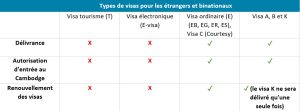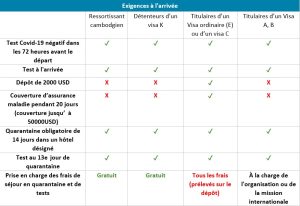2 February 2021
In reaction to the cases of community contagion which occurred at the end of November, the Ministry of Health (MoH) reacted by imposing new entry conditions for travelers entering from December 12, 2020 . With all the measures already in place, it can be difficult to know what exactly the requirements are based on individual circumstances and visa requirements. The wave of measures between November and December made the new rules somewhat difficult to understand.
To help you navigate through all of those Cambodia entry requirements, here is a summary of the current measures and requirements based on the various possible scenarios .
1. Requirements for Cambodian nationals and foreign nationals
On November 11, 2020 , the Ministry of Health announced new measures strengthening entry requirements to Cambodia for all travelers ( except diplomats or officials working for international organizations and flight personnel) – effective of 18 November . These requirements differ depending on the status of the traveler.
The Cambodian nationals who arrive in Cambodia and who hold a Cambodian passport or a foreign passport must undergo mandatory quarantine for 14 days, but free . They must be quarantined in a center or hotel designated by the government. The quarantine process ends when the person tests negatively on the 13th day of the mandatory quarantine.
Foreign travelers in general , in addition to having to obtain in advance a compatible visa (defined further in the article) , must submit on their arrival to a mandatory quarantine of 14 days in a hotel designated by the government (and produce a medical certificate attesting that they have tested negative no later than 72 hours before departure). In addition, they must deposit $ 2,000 upon arrival and purchase a Forte health insurance package for $ 90 (i.e. $ 50,000 coverage for 20 days https://www.forteinsurance.com/Covid-19-insurance/ ) . The quarantine process ends when the test is negative on the 13th day of the mandatory quarantine.
The December 4 announcement
New measures were announced on December 4, 2020 by the Ministry of Health concerning the entry conditions (in force since December 12 ). This announcement did not cancel the aforementioned measures of November 11, it did however suspend the sponsorship mechanism which allowed certain travelers to escape the 14-day quarantine in a designated hotel. This announcement stated:
-
A mandatory 14-day quarantine for all travelers entering Cambodia in addition to the obligation to produce a medical certificate attesting that the traveler has tested negative no later than 72 hours before departure (health insurance is also always required) .
-
The suspension of the sponsorship mechanism that existed for investors and company employees.
-
Disclosure of the identity of people who test positive for Covid-19.
2. Requirements for diplomats and officials of international organizations (IOs)
On December 19 , the Ministry of Health issued an announcement (effective December 19 ) specifically relating to diplomats and civil servants. Whereas previously diplomats and officials were exempt from the 14-day quarantine if they tested negative on arrival, they are now required to self-quarantine for a full 14 days (with Himawari Hotel option) in addition to the other requirements listed above (with the exception of the 24 hour waiting period, which is no longer in effect or relevant).
So, as of December 19, the only difference between diplomats and other travelers is that if the diplomat does not want to stay in the hotels designated for general quarantine, he can choose to stay at the Himawari hotel, while a regular traveler must stay at the hotel designated by the government on arrival.
This recent tightening of entry conditions probably stems from the case of community contagion on 28 November.
There is no longer any exception to the 14-day quarantine, even for diplomats (see however the specific case of air personnel detailed below).
3. The special case of air personnel
Like diplomats, air personnel fall into a special category. The entry conditions for him were determined on August 14, 2020. However, the August 14 directive issued by the Ministry of Health only provides that air personnel must “respect the health measures in force in Cambodia”. However, these measures are not defined in detail. This is why the announcement of December 4, 2020 indicating that “all travelers” had to undergo a quarantine left the air personnel in doubt. This doubt was thus removed on December 8, 2020 since the Secretary of State for Civil Aviation indicated that the measures announced on August 14, 2020 would continue to apply to air personnel beyond December 12, 2020.
Currently, we can distinguish two situations concerning air crews arriving in Cambodia.
-
Crews of airlines based in Cambodia would not be required to undergo a Covid-19 test since they communicate their team rotation schedule to the Ministry of Health.
-
For foreign airlines , there is a mandatory test on arrival . The crews must wait for the results at the Sokha or Dara hotel. If the test results are negative, they can fly back on the plane immediately after.
4. Visas and quarantine fees
As a reminder, that the Cambodian authorities no longer issue visas on arrival and do not issue electronic visas (E-visa) either until further notice.
All accommodation costs during quarantine for non-Cambodian travelers will be deducted directly from the $ 2,000 deposit. Do not expect the return of the initial deposit to be very high since the minimum cost of hotel quarantine and testing will be well over $ 1,000. The amount recovered from the initial deposit may vary but is typically no more than $ 500 according to many traveler reports.
5. Positive test during the first or second test:
In the event that a traveler is positive for Covid19 (regardless of the test), the Ministry of Health has designated three hospitals in Phnom Penh (the Khmero-Soviet Friendship Hospital, the National Pediatric Hospital and the Kunthabopha hospital) and 25 provincial hospitals as referral hospitals for the treatment of positive cases. However, it would appear that this information from the Ministry of Health has not been officially published. It was relayed on March 16, 2020 by several newspapers including the Khmer Times, as well as by the United States Embassy in Cambodia.[1]and the American Chamber (Amcham). When the Ministry of Health announced the pricing for quarantine measures for travelers going to the hospital for treatment ( Ministry of Health or MoH n ° 564 of June 11, 2020), only the term “Public hospitals” was used. The press has regularly reported since March that infected patients are being treated in the Khmer-Soviet Friendship Hospital. A press release from the Ministry of Health dated December 23, 2020, as well as many previous press releases, also mention that Covid19 patients are being treated at the Khmer-Soviet Friendship Hospital.
Entry requirements at a glance
You can quickly check the requirements according to your situation by consulting the summary tables below (applicable as of December 31, 2020).
Prior requirement, obtaining a compatible visa
Click the image to enlarge.
The T or tourist visa allows a stay of 30 days without multiple entries.
The electronic visa is a special online procedure for granting tourist (T) visas.
The facilities for issuing a type E visa may vary depending on the embassies and the situation of each. The easiest way to enter would apparently be the work / business visa.
EB refers to the standard Business visa, EG is a possibility of extending the EB visa, ER refers to the retirement visa and ES to the student visa. These four visas are called class E visas (not to be confused with the E-visa which is no longer issued).
Similar to the E visa, the C visa is reserved for people who work in NGOs.
The A visa is reserved for diplomats The B visa is intended for officials of international organizations. The K or Khmer visa can only be granted to Cambodian descendants who enter Cambodia with a foreign passport.
Requirements on arrival
At the end of November, Cambodia was facing its first cases of community transmission after experiencing a stable situation for many months. The measures taken by the government have largely responded to the international health situation but have echoed equally, if not more, the local health situation. Despite the gradual arrival of the vaccine, we should not expect a dramatic easing of entry measures in the country in the immediate future.
This article is published for general information purposes only and is not a substitute for legal advice. It is subject to change according to new measures and may no longer be relevant at any time.
Gautier Hardy works at SokSiphana & associates. In addition to his activity, he wishes to participate in the dissemination of aspects of Cambodian law to the French-speaking community.
For more information, please contact:
Gautier Hardy, Partner, SokSiphana&associates (a member of ZICO Law)
gautier.hardy@zicolaw.com







